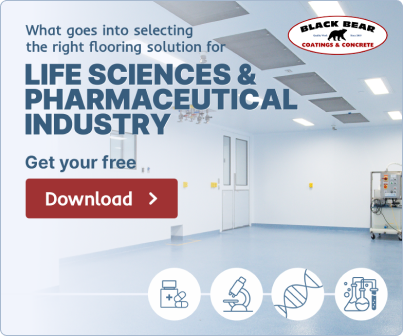There are numerous factors to consider when laying down pharmaceutical flooring in a production facility, or any other operation that involves working with chemicals. In these cases, the floor should be engineered for heavy duty use. Not only does it need to stand up to the rigors of daily business, while passing all relevant health…
Posts Categorized: Pharmaceutical Flooring
There are numerous reasons to choose epoxy-coated concrete for the flooring of your commercial or industrial business. Epoxy is exceptionally strong, long-lasting, easy to clean, and can even come in numerous eye-pleasing colors. However, one of the less obvious benefits of epoxy flooring is that the epoxy blend can be tailored to your needs. This means…
Seamless resinous floor coatings are ideal for a variety of commercial and industrial settings. For businesses, a seamless flooring system offers huge benefits over alternatives, such as bare concrete or vinyl tiles, while not having any major drawbacks aside from -potentially- a slightly higher installation cost. However, the durability and sustainability justify the up-front costs….
A seamless floor is the right choice for almost any business environment. They’re easy to clean, easy to sterilize, and less prone to wear and tear than other tile-based flooring solutions. From warehouses to pharmaceutical clean rooms, seamless floors deliver better safety and better ROI. That just leaves the question of what type of seamless…
Both methyl methacrylate (MMA) and epoxy floor coatings are viable alternatives for a concrete floor. However, each has its advantages and disadvantages. Here are a few tips on which facilities and business environments are best suited for MMA floors versus epoxy floors. Methyl methacrylate pros and cons – MMA cures quickly, so it’s a good…
Every industry has unique operating conditions and business requirements that influence large facility flooring decisions. Many flooring systems exist and at times, the choices may seem overwhelming. If your organization is in the market for new flooring, answering the following five questions may help you identify options that will best meet your needs: 1. Is…
The standards and practices that govern the manufacturing industry are regulated by several agencies. The Current Good Manufacturing Practices (CGMP) is an example of mandated standards facilities must abide by. These practices are focused on promoting clean and sterile work environments. Manufacturing plants are subject to multiple investigations throughout the year. From OSHA to the…
When designing a space for the creation of any materials intended for medical usage – from standard pharmaceuticals to novel new marijuana\THC delivery products – it’s vital to consider the impact of that space on the product. There’s an entire industry devoted to testing products for extractables and leachables (E&Ls) – chemicals in the creation…
When engineering a cancer diagnostic center and similar clean rooms you must consider the hygienic and compliance that starts from the ground up. A medical clean room must be capable of being completely sterilized to provide a safe and usable floor that both patients and staff can walk upon without incident. There are only a handful…
Acids, alkalis, solvents – these are just a few of the chemical compounds found in pharmaceutical manufacturing plants that are corrosive in nature and will destroy industrial flooring. Byproducts of biochemical engineering can deteriorate substrate, compromising the safety and integrity of a production environment. The pharmaceutical manufacturing industry requires commercial flooring to adhere to strict…



